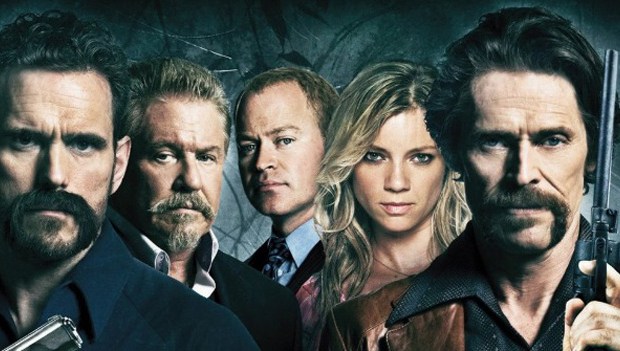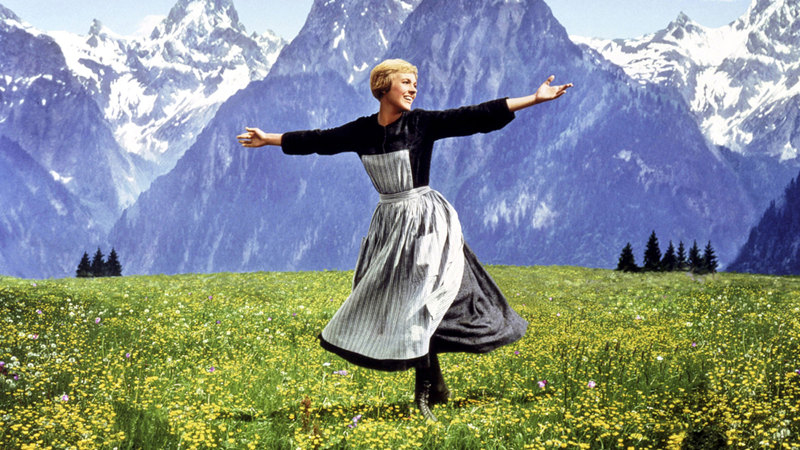When irony rules and most tongues are permanently grafted into cheeks, I suppose it’s pretty churlish to complain about a movie taking itself too seriously. But after watching “The Game” (1997) again, I still don’t understand why director David Fincher treated such a slight, absurd story with such relentless gloom and solemnity.
Perhaps Fincher wanted to make the film expressive of its congenitally dour protagonist, Nicholas Van Orton (Michael Douglas), a high-powered San Francisco investment banker who takes no joy in his work or, apparently, in any aspect of his life which, come to think of it, consists entirely of that joyless work. No wonder then that Nicholas celebrates his forty-eighth birthday by going to work and treating it like every other day and expecting everyone else to do the same. When a cheerful office worker offers him best wishes, he responds, “I don’t like her.”
It appears that nobody likes Nicholas much either. He lives alone except for the family housekeeper and only reluctantly fields a birthday call from his ex-wife: we don’t need to ask why she left. He does make time for the one person who actually wants to spend time with him, his younger brother Conrad (Sean Penn, looking thirty years younger just fifteen years ago) who gives him a mysterious birthday gift: an invitation to sign up with a company called Consumer Recreation Services (CRS).
The generically named outfit provides a decidedly distinct service, offering Nicholas the opportunity to play The Game. The detail-oriented Nicholas is frustrated in his attempts to pin down the specifics of the titular activity, and CRS salesman Jim Feingold (James Rebhorn) is professionally elusive: “We’re like an experiential Book-of-the-Month Club.” As Nicholas will soon learn, everyone is elusive when it comes to CRS. When Nicholas grills a former gamer, the man answers smugly with a Bible reference, always the surest way to guarantee content-free pseudo-profundity.
Nicholas’ considerable investigative and analytical skills fail him once The Game finally begins. The Game, it turns out, is just about anything you want it to be, or, in this case, just about anything Nicholas doesn’t want it to be. He is trapped in an elevator, his house is vandalized, his financial empire is sabotaged, and pretty soon Nicholas starts to believe that everyone is in on The Game (even his brother!), and that The Game very well might only end when he dies.
He’s got at least the first part of that right, and that’s part of the problem with the movie. Fincher and screenwriters John Brancato and Michael Ferris craft an incredibly elaborate world of enveloping paranoia and nonstop baits-and-switches on a scale that includes not only the entire city of San Francisco but eventually even crosses national borders. Seemingly real locations morph abruptly into movie sets and “regular” people are revealed time and again to be actors in CRS’ labyrinthine script. Nicholas, the confident wheeler dealer, is reduced to a bundle of jangled nerves (Gordon Gekko now wracked by self-doubt) as he realizes he can no longer count on anything or anybody.
But when nothing is EVER what it seems to be, then eventually everything winds up being exactly what it seems to be. The viewer might not be able to guess the specific way each sequence will resolve or each plot thread will unravel, but once it’s obvious (far too soon) that every scene involves a clever reveal, that Nicholas is always going to be one step behind the master Gamers, that there is always another layer of the looking-glass onion to peel back, the story becomes leadenly predictable. Yep, she’s lying. Yep, he’s lying. Yep, CRS Is behind it. Yep, Nicholas, you’re screwed.
“The Game” was Fincher’s second feature after the critically lauded “Se7en” (1995), and it earned him comparisons to Alfred Hitchcock. Hitchcock certainly didn’t shy away from ludicrously plotted thrillers that didn’t pass even a rudimentary plausibility test, but he had such a light touch and wry sense of humor that it never mattered. The more literal-minded Fincher makes “The Game” about as much fun as a tour through a pediatric cancer ward, dialing every scene to maximum portentousness with jittery editing, distorted audio, slow-motion, a pulverizing score by Howard Shore, and icy blue filters all designed to amp up the sense of corporate paranoia and millennial gloom. The crushing gravity of the whole endeavor makes the implausibilities (vampire squid CRS has endless resources, infinite scope, and can predict Nicholas’ reactions almost down to the exact second and square inch) seem more like glaring weaknesses than Hitchockian flourishes.
It’s all technically polished, as we would expect from Fincher and certainly from cinematographer Harris Savides, but after an intriguing set-up, “The Game” becomes an irritating Rube Goldberg contraption that prompts more “Give me a break!”s than genuine frissons. And the ending is a giant “Oh come on!” that might annoy viewers who have not fully bought into the premise. But if you’re in a more receptive and forgiving mood, perhaps you can enjoy the bumpy ride.
Video:
The film is presented in its original 2.40:1 wide-screen aspect ratio. “The Game” was previously released on HD-DVD in 2007, but this is its Blu-ray debut in North America. To say the least, the film relies on shadows and heavily filtered shots, and you might notice some instances of slight noise in the darkest shots, but nothing that detracts significantly from the high-def transfer. The image detail is razor sharp throughout, with background details really standing out and close-ups really popping.
Audio:
Criterion has included two audio options: the Theatrical 5.1 (DTS-HD) and a Near Field 5.1 (DTS-HD). According to Criterion, the Theatrical is “very dynamic and designed to be played in large rooms at high volume” while the Near Field mix (created in 1997 for Criterion’s laser-disc release) “features a lower dynamic range and is optimized for playing in smaller rooms at lower volume.” I think Criterion’s description is pretty accurate, and since I live in an apartment and wish to maintain the peace while still watching movies late at night, I have a strong preference for the near field which is also the default option. I don’t think you lose all that much in terms of dynamism by going with the near field, but audiophile junkies might think differently.
Optional English subtitles support the English audio.
Extras:
Criterion appears to have imported the old-school extras from its 1997 laser-disc release of “The Game” though I don’t have a resource that allows me to check whether everything is precisely duplicated.
The commentary track was definitely recorded in 1997 for the laser-disc and features Fincher, cinematographer Harris Savides, Michael Douglas, screenwriters John Brancato and Michael Ferris, production designer Jeffrey Beecroft, digital animation supervisor Richard “Dr.” Baily, and visual effects supervisor Kevin Haug. The various collaborators were recorded separately and the audio editing can sound a bit choppy as we jump from one man to another, but overall it’s a lively and informative discussion, somewhat heavy on technical details.
The disc includes an Alternate Ending (71 sec., and nothing surprising or revelatory – for a change!) and the full version of the Psychological Test Film (1 min.) that CRS administers to Nicholas in the movie.
The disc also includes Film-to-Storyboard comparisons for four scenes from the movies. These sequences split the screen, showing the original storyboards at the top and letting the final cut footage play on the bottom. Each runs from 1 min. to 4 min.
Similarly, we get Behind-the-Scenes Footage shot exclusively for Criterion at the time of the same four scenes as well as some Location Footage. They run a little less than a half hour in total, and can be played with optional commentary by the same folks as on the main feature commentary.
The collection wraps up with a Teaser, a Teaser Render Test (each about a minute long) and a Trailer (just over two minutes). The first two have optional commentary by Richard “Dr.” Baily and the Trailer has commentary by Fincher.
The appropriately black-heavy 16-page insert booklet features a rather effusive essay by the superb critic David Sterritt. I don’t agree with him at all in this case, but Mr. Sterritt is always an essential read.
Film Value:
“The Game” isn’t quite a conspiracy story, but it’s close, and that might be my least favorite thriller sub-genre. So perhaps I’m just not the target audience for Fincher’s exercise in metronomically-precise paranoia. Fans have been waiting for a proper Blu-ray release for quite some time, and they will no doubt be pleased with the technical specs on this high-def transfer. The extras leave a bit to be desired, but they’re not bad.


